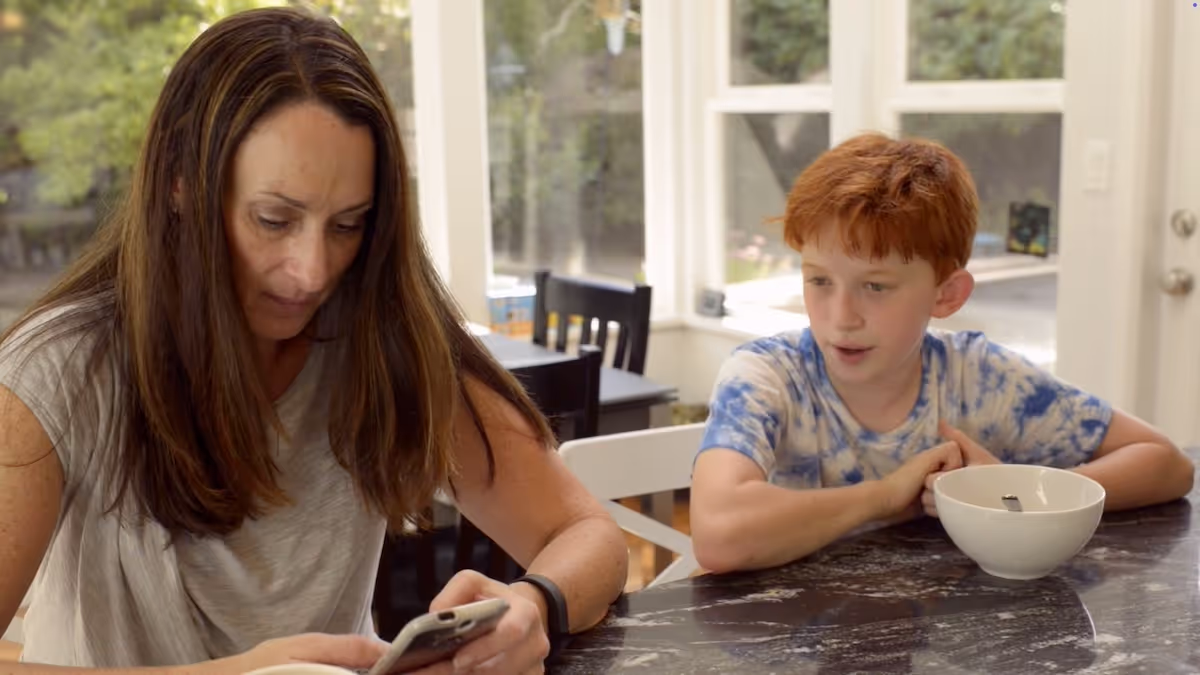


We live in a society with a loud and clear message: “Family life is private life.” When things go awry, the memo most of us were raised with tells us, "You and your family should deal with it on your own.”
Then the tech revolution tsunami hit and flooded all of our homes. What was the response? Was there a national invitation to get all concerned people together to share what was happening to their kids and families and to find solutions? Of course not. Instead, it was every family for themselves.
I decided to make the Screenagers movies to bring communities together — to stop family silos — and inspire post-screening conversations about helpful strategies.
Research has shown that people are particularly influenced by their peers, and this doesn’t just apply to teens. Adults are influenced by their peers, too.
In countless post-screening Screenagers and Screenagers Next Chapter discussions I’ve run, I have watched entire rooms perk up when people share screen time limits they have tried and what has or has not worked. So often, one person sharing something vulnerable is the catalyst needed to get others to share as well.
The other night, I was leading a post-screening Q&A with parents of elementary school-aged kids, and a parent stood up and asked a question. She mentioned that in her home, they use tech to shut the wifi off at 9 p.m. on weekdays and 10 p.m. on weekends. She emphasized this has made a big difference in their home.
Learn more about showing our movies in your school or community!
Join Screenagers filmmaker Delaney Ruston MD for our latest Podcast

Learn more about our Screen-Free Sleep campaign at the website!
Our movie made for parents and educators of younger kids
Learn more about showing our movies in your school or community!
Other audience members started sharing things they had experimented with after her comment. After the Q&A, I saw parents gather to continue the sharing.
Hearing ideas from people in our circles can significantly impact us in many ways. For example, it might get us to try something new, and being able to follow up with the person who shared the idea can get us through challenging times. Another thing is that parents often believe other parents are much more permissive around tech than they actually are.
Learn more about showing our movies in your school or community!
Join Screenagers filmmaker Delaney Ruston MD for our latest Podcast

Learn more about our Screen-Free Sleep campaign at the website!
Our movie made for parents and educators of younger kids
Join Screenagers filmmaker Delaney Ruston MD for our latest Podcast
One final thought, since I am always on the hunt for more tech time-out ideas to share with all of you, please consider sending me any answers to the questions above. This will help me share more ideas — anonymously — with our wonderful Screenagers community. By the way, thank you for being a part of it.
As we’re about to celebrate 10 years of Screenagers, we want to hear what’s been most helpful and what you’d like to see next.
Please click here to share your thoughts with us in our community survey. It only takes 5–10 minutes, and everyone who completes it will be entered to win one of five $50 Amazon vouchers.
We live in a society with a loud and clear message: “Family life is private life.” When things go awry, the memo most of us were raised with tells us, "You and your family should deal with it on your own.”
Then the tech revolution tsunami hit and flooded all of our homes. What was the response? Was there a national invitation to get all concerned people together to share what was happening to their kids and families and to find solutions? Of course not. Instead, it was every family for themselves.
I decided to make the Screenagers movies to bring communities together — to stop family silos — and inspire post-screening conversations about helpful strategies.
Research has shown that people are particularly influenced by their peers, and this doesn’t just apply to teens. Adults are influenced by their peers, too.
In countless post-screening Screenagers and Screenagers Next Chapter discussions I’ve run, I have watched entire rooms perk up when people share screen time limits they have tried and what has or has not worked. So often, one person sharing something vulnerable is the catalyst needed to get others to share as well.
The other night, I was leading a post-screening Q&A with parents of elementary school-aged kids, and a parent stood up and asked a question. She mentioned that in her home, they use tech to shut the wifi off at 9 p.m. on weekdays and 10 p.m. on weekends. She emphasized this has made a big difference in their home.
Other audience members started sharing things they had experimented with after her comment. After the Q&A, I saw parents gather to continue the sharing.
Hearing ideas from people in our circles can significantly impact us in many ways. For example, it might get us to try something new, and being able to follow up with the person who shared the idea can get us through challenging times. Another thing is that parents often believe other parents are much more permissive around tech than they actually are.
One final thought, since I am always on the hunt for more tech time-out ideas to share with all of you, please consider sending me any answers to the questions above. This will help me share more ideas — anonymously — with our wonderful Screenagers community. By the way, thank you for being a part of it.
Sign up here to receive the weekly Tech Talk Tuesdays newsletter from Screenagers filmmaker Delaney Ruston MD.
We respect your privacy.
We live in a society with a loud and clear message: “Family life is private life.” When things go awry, the memo most of us were raised with tells us, "You and your family should deal with it on your own.”
Then the tech revolution tsunami hit and flooded all of our homes. What was the response? Was there a national invitation to get all concerned people together to share what was happening to their kids and families and to find solutions? Of course not. Instead, it was every family for themselves.
I decided to make the Screenagers movies to bring communities together — to stop family silos — and inspire post-screening conversations about helpful strategies.
Research has shown that people are particularly influenced by their peers, and this doesn’t just apply to teens. Adults are influenced by their peers, too.
In countless post-screening Screenagers and Screenagers Next Chapter discussions I’ve run, I have watched entire rooms perk up when people share screen time limits they have tried and what has or has not worked. So often, one person sharing something vulnerable is the catalyst needed to get others to share as well.
The other night, I was leading a post-screening Q&A with parents of elementary school-aged kids, and a parent stood up and asked a question. She mentioned that in her home, they use tech to shut the wifi off at 9 p.m. on weekdays and 10 p.m. on weekends. She emphasized this has made a big difference in their home.

Thoughtful family tech rules help protect kids’ wellbeing, learning, and sleep while strengthening connection at home. Using the fresh start of a new year, this post shares eight practical tech habits families can discuss and adapt together, including shared social media check-ins, screen time inventories, device-free meals, regular gaming breaks, and keeping phones out of bedrooms at night.
READ MORE >
Psychologist Jean Twenge explains how parental controls can support healthier tech use by protecting sleep, limiting late night device access, and reducing kids’ exposure to content they are not developmentally ready to handle. She discusses why third party parental control tools are often more effective and easier to use than built in options, while acknowledging that no system is perfect. Clear boundaries, combined with technology based limits, can reduce ongoing conflict and make screen time rules easier to enforce.
READ MORE >
for more like this, DR. DELANEY RUSTON'S NEW BOOK, PARENTING IN THE SCREEN AGE, IS THE DEFINITIVE GUIDE FOR TODAY’S PARENTS. WITH INSIGHTS ON SCREEN TIME FROM RESEARCHERS, INPUT FROM KIDS & TEENS, THIS BOOK IS PACKED WITH SOLUTIONS FOR HOW TO START AND SUSTAIN PRODUCTIVE FAMILY TALKS ABOUT TECHNOLOGY AND IT’S IMPACT ON OUR MENTAL WELLBEING.
